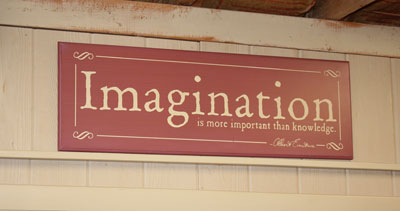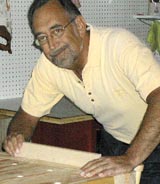|
|
|
|
The Down to Earth Woodworker
By Steven D. Johnson
Racine, Wisconsin
|
|
This Month's Column:
•
Einstein On Woodworking
•
Many Roads – One Destination
•
Room Addition Nickel Tour
Einstein On Woodworking
Click on any picture to see a larger version.
There is precious little folderol in my shop… there is simply little space for doo-dads, knickknacks, and non-woodworking paraphernalia. But of the few pieces of tchotchke I have, my favorite is this quote from Albert Einstein: "Imagination is more important than knowledge." The sign is above the window next to my work bench, and I look at it almost every day. This quote is excerpted from a longer statement from Mr. Einstein:

|
Figure 1 - Above the window next to my work bench...an important reminder that
hopefully guides my work
|
"I am enough of the artist to draw freely upon my imagination. Imagination is more important than knowledge. Knowledge is limited. Imagination encircles the world."
To understand the implications for woodworking, it is important to study and think deeply about the definitions.
Knowledge
is the collection of skills and information a person has acquired through experience.
Intelligence
is the ability to apply knowledge.
Imagination
is the creative ability to form images, ideas, and sensations in the mind without direct input from the senses, such as seeing or hearing. In other words,
Intelligence
is the ability to apply
knowledge
, therefore the hyper intelligent Albert Einstein may have been defining his own
super intelligence
as the ability to apply
knowledge
in
imaginative
ways.
In the past, house shopping for me was simple… the first "go" or "no go" drive past a home was to determine if there was a suitable place for a shop. If not, on to the next house… no reason to look inside. Having passed the "shop first" test, I was once taking a house tour led by the homeowner. I asked to see the basement to determine where power entered the house and how costly it would be to run adequate circuits to the three-car garage that would become my shop. Learning that I was a woodworker, he was anxious to show me a china cabinet he had built.
Fully expecting to be detoured to the dining room, we headed straight for the basement. And there, at the bottom of the stairs, was one of the most massive, and frankly ugly, china cabinets I have ever seen. Don't get me wrong… technically, it was near perfect. Joinery was exacting, dovetails beautiful, scroll work galore, cut glass in well-built doors, knobs and pulls perfectly aligned, drawers that opened smoothly and effortlessly, solid oak with a nice smooth finish, lots of flourishes and molding, lots of gingerbread. But it was hideous. The scale was all wrong. The design was incoherent. There was no symmetry or balance. It simply did not "work." Hence the reason, I presume, that it was in the basement.
As the gentleman proudly showed me various aspects of his handiwork, I wondered exactly how someone possessing his obvious skills, knowledge, and experience could possibly build something so ugly. It wasn't until one morning I pondered his monstrosity and Einstein's quote that I realized that the successful interrelation of intelligence / knowledge / imagination is a balance as delicate as energy equals mass times the speed of light squared. If just one component of this delicate relativity is "short" or one a bit "long" the relationship gets thrown out of whack and nothing quite "works."
I once saw X-ray images of the joinery in a magnificent museum piece and the tenons were misshapen and oddly formed ill-fitting appendages in a mortise that was also quite different from the image of "perfection" we woodworkers hold in our mind's eyes. There were reinforcement blocks glued in places that most of us would consider unnecessary or superfluous, yet they were needed, given the imperfections of the joinery. Outwardly, the piece was absolutely stunning. And no doubt the piece had stood the test of time, but still… it made me ponder. The absolute brilliance of the craftsman that built the piece was not in achieving perfect knowledge, experience, or precision, but in a careful blending of knowledge with brilliant imagination.
My question to all woodworkers is simply this… would you be willing to sacrifice a bit of your technical know-how for imagination? Would you trade some skill for the imagination to create something outstanding? If you built a magnificent piece that people raved over, would the misshapen tenon or the bit of putty you had to put in a miss-cut dovetail diminish the overall gestalt of the piece?
Imagination
is
more important than knowledge… and skill… and expertise. Imagination encircles the world. Words to live by.
(Page 1 of 3)
1
2
3
Next Page

Steven Johnson is retired from an almost 30-year career selling medical equipment and supplies, and now enjoys improving his shop, his skills, and his designs on a full time basis (although he says home improvement projects and furniture building have been hobbies for most of his adult life). Steven can be reached directly via email at
sjohnson@downtoearthwoodworking.com
Return to the
Wood News Online
front page
|
|
|
|
|